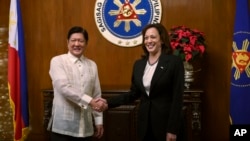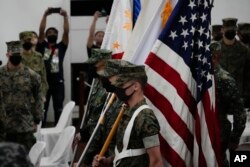Visiting U.S. Vice President Kamala Harris Monday reiterated the U.S. commitment to the Philippines, one of Washington’s oldest allies in a region where China is expanding its diplomatic and economic clout.
“We stand with you in defense of international rules and norms as it relates to the South China Sea,” Harris said during her meeting with Philippine President Ferdinand Marcos, Jr. in Manila, Monday. “An armed attack on the Philippines Armed Forces, public vessels or aircraft would invoke U.S. mutual defense.”
Harris was referring to the 1951 Mutual Defense Treaty, between the United States and countries in the region including the Philippines and Thailand, that stipulates the collective defense principle under an attack.
Her trip to the Philippines this week is part of the Biden administration courting an increasingly vital strategic partner as tensions rise with China over Taiwan. Of Washington’s five treaty allies in the Indo-Pacific, the Philippines is closest to Taiwan and therefore central to U.S. plans to deter and respond to potential Chinese attack on the self-administered island Beijing views as a wayward province.
It also signals an effort to rebuild U.S.–Philippines ties that were fractured under Marcos’ predecessor, Rodrigo Duterte, who sought closer relations with China during his six years in office. Relations also soured over allegations of human rights abuses under Manila’s draconian policies on drugs – with Duterte in 2016 calling then-President Barack Obama a "son of a whore" over warnings the then-Philippine leader would be questioned over his drug war.
Enhanced defense cooperation
Harris and Marcos discussed new projects including establishing additional defense sites around the Philippines, part of the Enhanced Defense Cooperation Agreement (EDCA) between the two countries. EDCA allows U.S. troops to use agreed locations in the Philippines for security exercises and joint military training on a rotational basis.
There are currently five EDCA locations and additional new ones have been identified, a senior administration official told reporters in a briefing to reporters Monday.
“This will allow for more security cooperation exercises, combined training activities, and it will allow us to respond to disaster relief and humanitarian assistance needs,” the official said, declining to provide details on those locations.
The EDCA was signed in 2014 but identification of sites has dragged on for year due to the pandemic and fraught ties under Duterte, said Charmaine Misalucha-Willoughby of the Foundation for the National Interest, a Philippine research group.
“Now that the alliance is back on track, it is but high time for both sides to reinvigorate the bilateral relationship through EDCA,” Misalucha-Willoughby told VOA. “This is an especially welcome move and is perceived positively by the Filipino strategic community for its HADR (humanitarian and disaster relief) angle.”
During the Cold War, the Philippines hosted some of America's largest overseas bases that were instrumental in U.S. wars in Korea and Vietnam. Clark Air Base and Subic Bay Naval Base were transferred to Manila’s control in the 1990s but in recent years the allies have returned to increased military cooperation in response to Chinese military activities in the South China Sea, where the Philippines has rival claims.
Deter attacks on Philippines
Harris’ statement on mutual defense is the latest invocation of the commitments the U.S. ambassador to the Philippines, Thomas Hubbard, reiterated in his 1999 letter to the Philippine secretary of foreign affairs, and that Washington has regularly reaffirmed since 2019, said Aaron Connelly, research fellow at the International Institute for Strategic Studies in Singapore.
“The goal is to deter attacks on Philippine vessels,” Connelly told VOA. “It doesn’t apply to the Spratlys or Scarborough Shoal themselves, with the possible exception of Second Thomas Shoal in the Spratlys.”
In 1999 the Philippine government deliberately had Philippine naval vessel BRP Sierra Madre run aground on the shoal to assert Philippine sovereignty in the country's dispute over the Spratly islands.
Like many in the region, the Marcos government seeks to navigate the U.S.–China rivalry by adopting the "friend to all and an enemy to none" policy. “In many ways, this is still an exercise of an independent foreign policy, but whereas Duterte's definition was to be independent from the U.S. and to be dependent on China, Marcos seems more adept at playing this game of hedging,” Misalucha-Willoughby said.
With President Joe Biden attending the Association of Southeast Asian Nations (ASEAN) summit in Phnom Penh, Cambodia and Group of Twenty (G-20) summit in Bali, Indonesia recently and Harris participating in the Asia Pacific Economic Cooperation (APEC) Summit in Bangkok, Thailand this month, the region is seeing a flurry of high-level diplomatic engagements.
U.S. Secretary of Defense Lloyd Austin was in Jakarta Monday to meet Indonesian counterpart Prabowo Subianto. Austin will continue to Siem Reap, Cambodia, for an ASEAN and partners’ Defense Ministers’ Meeting.
During a speech Sunday at the Halifax International Security Forum, Austin said his department’s biggest challenge is “an increasingly assertive China that is trying to refashion both the region and the international system to suit its authoritarian preferences.”
Palawan island
From Manila, on Tuesday Harris heads to the Palawan island chain in the South China Sea, just 330 kilometers east of the disputed Spratly Islands claimed entirely by China and partly by Brunei, Malaysia, the Philippines, Taiwan and Vietnam.
She will reaffirm U.S. support for a 2016 U.N. arbitral tribunal ruling that rejected China’s maritime claims in the South China Sea, and underscore Washington’s “commitment to stand up for international rules and norms,” a senior administration official said.
Harris will also meet fishing communities in Palawan to underscore “the consequences of illegal unregulated and unreported fishing. According to the latest IUU Fishing Index, China is the worst offender of illegal, unreported, and unregulated fishing among 152 coastal countries. The IUU document is the Illegal, Unreported and Unregulated Fishing Index.
Editor's note: This story has been changed to correct the name of 1951 Mutual Defense Treaty.





